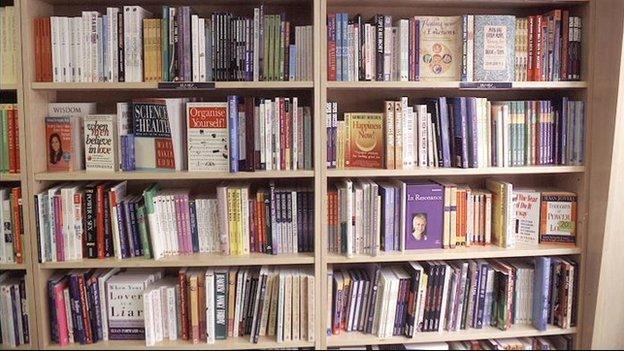I was told 'Dyslexia is the long word for stupid'
- Published

After a woman with dyslexia won a disability discrimination case against Starbucks, people with the condition have been describing what it is like to live and work with it.

'You are stranger in a foreign land'
Peter Hicks, from Dorset, writes: "I've had it since I was a child, but it was never diagnosed.
"If you have it, you are a stranger in a foreign land, because you don't belong in their system.
"Slow to read is a prime example, although it depends on your spectrum.
"I speed-read and have to read the page three or four times to try to get the gist of it.
"I'm self-taught, and my brain adapts to problem-solving.
"I worked up from a machine minder to technician for Swiss gear-cutting machines and have repaired [Computer Numerical Control] machines because my brain can visualise the electrical-mechanical train of events.
"Being a dizzy [dyslexic] means I see things in a different way.
"Yes, it's difficult within their system - but I'm glad my brain is wired different.
"There are differing degrees, same as autism.
"I'm lucky my wife is 'off wave' as well, so she understands.
"Look at people like some rock stars who can't read music but can just play instruments, there are a lot of us out there, we make things we understand, but we don't fit in the system because our brains can work at the speed of light, in our world, it's the others that are slow and don't fit."


Jonathan Storey is hoping to teach in the United States this summer
'Teachers... would humiliate me in front of the entire class'
Jonathan Storey, from London, says: "As a dyslexic myself, I've had various issues with learning 'simple tasks' and following instructions that feel like mammoth workloads in work and school.
"It was most difficult when I was studying at secondary school.
"Many of the teachers didn't recognise dyslexia and thought I was stupid and lazy and would humiliate me in front of the entire class for sub-standard work.
"I went to a different school for my A-levels, and the pastoral care and awareness was much better, and subsequently went on to get an MA in drama.
"My day job is working in an art shop in Shoreditch.
"I'm a musician and recently had some of my stuff on BBC Introducing.
"I also teach guitar, and I'm going out to the States this summer to teach."


Some dyslexics find large companies struggle to accommodate them
"Anyone with dyslexia needs to be very careful choosing a career"
Will Douglas-Mann, from Devon, says: "I was lucky to be diagnosed dyslexic at school (unusual in the 1960s), and my teachers took the trouble to learn how to help me get round it.
"There was a bit of the 'working-class children are thick, middle-class children are dyslexic' around at first.
"Work has always been a problem.
"At first, my inability to follow written instructions despite appearing intelligent and articulate in conversation led managers to conclude I was lazy.
"However, whenever I have had the opportunity to learn and settle into a job, I have done well.
"Things have got more difficult over the years
"Although most employers pay lip service to helping dyslexics, in reality frequent restructuring and flexible work patterns have resulted in the 'ecological niches' suitable for dyslexics shrinking in number, and job descriptions can suddenly change to include new duties which are difficult to cope with.
"Pressure on managers means they are less tolerant of those who do not pick up skills in the 'standard time' allowed in most training packages.
"Anyone with dyslexia needs to be very careful choosing a career.
"They must find an area where they can shine - there are many - and avoid big inflexible organisations which demand 'flexibility' from their staff."


Angelina Souter with her mother, Amanda
'I was told, 'Dyslexia is the long word for stupid''
Amanda Souter says of her daughter Angelina: "My daughter was lucky to be educated in New York, where she tested at seven and dyslexia was identified.
"She received an hour a day of special education.
"As a result, she's learned strategies that make her dyslexia almost invisible to the outside world.
"However, we returned to London when my daughter was about 14 and were shocked at the contrast.
"We applied to over 20 secondary schools, and each time she was rejected.
"Today, my daughter is at university and has received technology.
"However, she tells me that the government are withdrawing this facility.
"Since coming home to London, I am constantly shocked by attitudes to dyslexia.
"Many teachers at my daughter's school would not recognise that dyslexia even exists.
"I heard several stories about teachers referring to students as 'stupid'.
"Similarly, the work environment has little space or sympathy for dyslexics.
"Occasionally, I recognised the signs of dyslexia in people I work with, but they always see the need to cover it up.
"When I spoke to a colleague about a dyslexic intern I felt needed support, she was was unsympathetic.
"'Dyslexia is the long word for stupid,' she told me.
"Britain is an amazing country for advocating the needs of people with differences.
"However, one it has overlooked is raising awareness and addressing the needs around dyslexia."

Interviews by Hannah Henderson